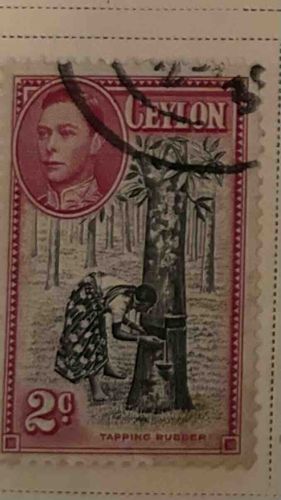
Ceylon 'Tapping Rubber' Postage Stamp (George VI Issue)
This item is a vintage postage stamp from Ceylon, featuring a portrait of King George VI and a scene depicting 'Tapping Rubber'. The stamp is predominantly red and pinkish-red in color, with a central image printed in a grayscale or sepia tone, possibly indicating a multi-color printing process or a specific color scheme for the series. The stamp has a perforated edge, typical of postage stamps, and appears to be part of a larger sheet as evidenced by the perforations on the top and right edges, and a partial stamp impression on the right. The upper left corner features a circular vignette of King George VI facing left, rendered in a detailed, somewhat formal style. To the right of his portrait, the word 'CEYLON' is prominently displayed in a bold serif font. The main scene below depicts a person, likely a rubber tapper, in traditional attire, bending over to attend to a rubber tree. A small cup or receptacle is visible attached to the tree, collecting latex. The background illustrates a plantation of rubber trees, suggesting the economic importance of rubber to Ceylon (now Sri Lanka) during the period of issue. In the lower left corner, the denomination '2 C' (likely for 2 Cents) is clearly printed in a stylized font. Below the central scene, the words 'TAPPING RUBBER' are inscribed, identifying the activity depicted. The overall design is framed by a decorative border, enhancing its aesthetic appeal. Condition-wise, there is a prominent black ink cancel mark diagonally across the upper right portion of the stamp, extending over the king's portrait and the 'CEYLON' inscription, indicating it has been used. The paper appears to be in relatively good condition, with no immediate signs of major tears or creases, outside of typical wear associated with a used stamp. The image resolution suggests that the print quality is fine, with clear details in both the portrait and the scene. The style and inclusion of King George VI place this stamp squarely in the mid-20th century, likely between 1937 and 1952.
AI-Generated Appraisal Disclaimer
Estimated Value
$5 - $15
Basic Information
Category
Postage Stamp
Appraised On
February 8, 2026
Estimated Value
$5 - $15
Item Description
This item is a vintage postage stamp from Ceylon, featuring a portrait of King George VI and a scene depicting 'Tapping Rubber'. The stamp is predominantly red and pinkish-red in color, with a central image printed in a grayscale or sepia tone, possibly indicating a multi-color printing process or a specific color scheme for the series. The stamp has a perforated edge, typical of postage stamps, and appears to be part of a larger sheet as evidenced by the perforations on the top and right edges, and a partial stamp impression on the right. The upper left corner features a circular vignette of King George VI facing left, rendered in a detailed, somewhat formal style. To the right of his portrait, the word 'CEYLON' is prominently displayed in a bold serif font. The main scene below depicts a person, likely a rubber tapper, in traditional attire, bending over to attend to a rubber tree. A small cup or receptacle is visible attached to the tree, collecting latex. The background illustrates a plantation of rubber trees, suggesting the economic importance of rubber to Ceylon (now Sri Lanka) during the period of issue. In the lower left corner, the denomination '2 C' (likely for 2 Cents) is clearly printed in a stylized font. Below the central scene, the words 'TAPPING RUBBER' are inscribed, identifying the activity depicted. The overall design is framed by a decorative border, enhancing its aesthetic appeal. Condition-wise, there is a prominent black ink cancel mark diagonally across the upper right portion of the stamp, extending over the king's portrait and the 'CEYLON' inscription, indicating it has been used. The paper appears to be in relatively good condition, with no immediate signs of major tears or creases, outside of typical wear associated with a used stamp. The image resolution suggests that the print quality is fine, with clear details in both the portrait and the scene. The style and inclusion of King George VI place this stamp squarely in the mid-20th century, likely between 1937 and 1952.
Related Tags
Get Your Items Appraised
Instant estimates of your treasures with AI-powered instant appraisals